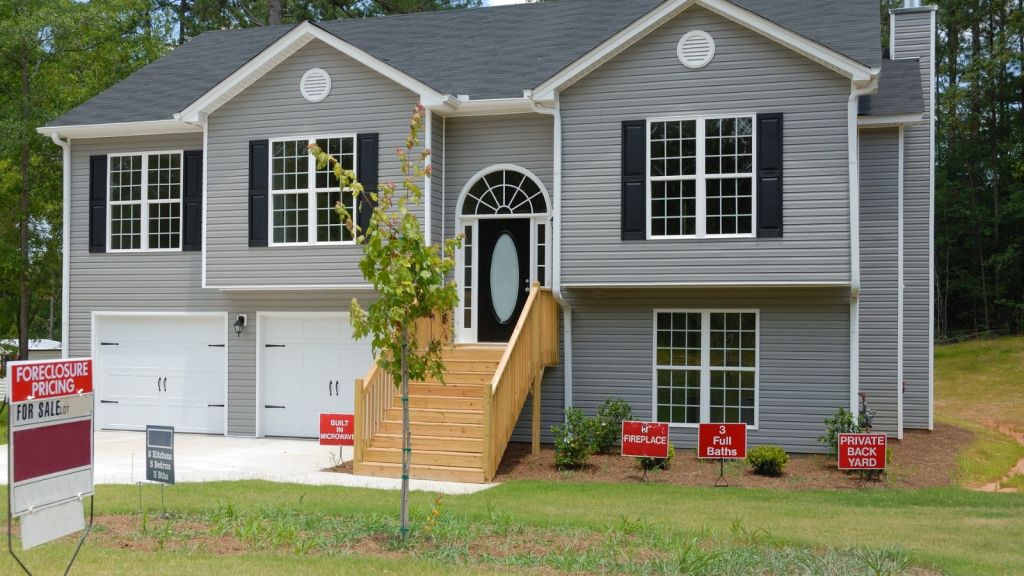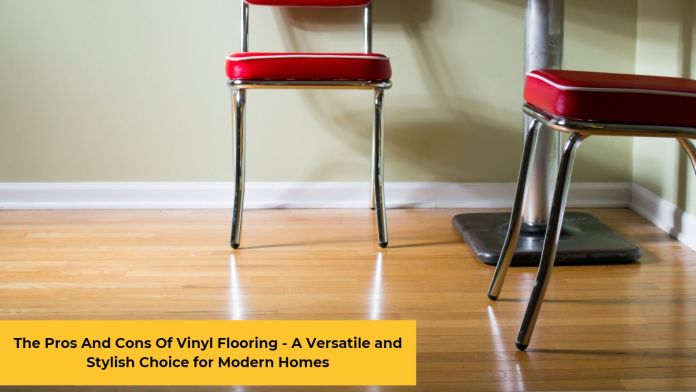Vinyl flooring has become famous for homeowners looking for style, durability, and affordability. With its wide range of designs and benefits, vinyl flooring has become a go-to choice for residential and commercial spaces. This article will explore vinyl flooring, its advantages, types, installation process, and why it has gained widespread popularity.
Here is a quick overview comparison of whether you should consider installing vinyl flooring:
| Pros | Cons |
| Versatility in design | Permanent Damages/ Scratches |
| Durability | Fading |
| Straightforward installation | Not So Straightforward Repair/ Replacement |
| Water + Moisture + Stain Resistance | Health concerns |
| Comfortable Underfoot Feel | Environmetal concerns |
| Save Your Money | Home resale value goes down |
Read on for more details on each point.
The Pros Of Having Vinyl Flooring
#1. Versatility in Design
One of the most fantastic perks of vinyl flooring is its chameleon-like ability to fit into any design aesthetic. Vinyl flooring can convincingly impersonate natural materials like hardwood, stone, or ceramic tiles, thanks to modern manufacturing. Its wide array of colors, patterns, and textures means it can slide smoothly into any decor, whether for a traditional vibe or a contemporary look. In a nutshell, vinyl flooring is a design wonder-worker that suits any style.
Read more: How To Use Bathroom Tiles To Change the Look of Your Bathroom.
#2. Durability
Vinyl flooring is renowned for its exceptional durability and resilience. Constructed with multiple layers, including a wear layer, vinyl flooring is resistant to scratches, stains, and moisture. This advantage makes it an excellent choice for commonly-crowded areas, like kitchens, bathrooms, and entryways, where durability is paramount. Additionally, vinyl flooring is less prone to cracking or warping than natural materials, making it a reliable long-term investment.
#3. Straightforward Installation & Maintenance
Vinyl flooring is known for its easy installation process, making it a popular choice for DIY enthusiasts. It comes in various formats, including vinyl planks and tiles, each with its installation method. Many vinyl flooring options feature a click-lock system, allowing for a hassle-free installation without adhesives. Furthermore, vinyl flooring requires minimal maintenance. Regular sweeping or vacuuming and occasional damp mopping are sufficient to keep it looking its best.
#4. Water/Moisture/Stain Resistance
Vinyl flooring is like the superhero of floorings – it laughs in the face of water and moisture and is also a champ at resisting stains. It’s an ideal buddy for your kitchen, bathroom, or basement, where hardwood or carpet might struggle. Spills? No problem. The bonus is that it keeps those pesky molds and mildew at bay.
Read more: Should You Buy Smartcore Ultra Vinyl Plank Flooring?
#5. Comfortable Underfoot Feel
The vinyl flooring offers a comfortable underfoot feel thanks to its resilient and cushioned surface. It provides a slight give when walked upon, reducing fatigue and impact on joints. Additionally, vinyl flooring can be installed with an underlayment, further enhancing its comfort level and noise absorption properties. This flooring will be an excellent option for homes with children or individuals who spend extended periods on their feet.
#6. Cost-Effective
Vinyl flooring is known for its affordability, making it an attractive choice for homeowners on a budget. Compared to natural materials like hardwood or stone, vinyl flooring offers a cost-effective solution without compromising style or quality. Its long lifespan and minimal maintenance requirements make it a wise investment that provides excellent value for money.
The Cons Of Having Vinyl Flooring
#1. Permanent Damages/ Scratches
A scratch or tear cuts through the wear layer (the top surface is usually imprinted with the design and finish) and exposes the core material. Because the wear layer and the design are essentially the same in vinyl flooring, when it’s damaged, there’s no ‘backup’ layer underneath that can visually replace the scratched area. The damage is permanent because we can’t ‘sand and refinish’ vinyl like we can with natural wood floors. Once a scratch or gouge is in your vinyl, it will stay unless the affected plank or tile is replaced entirely.
Read more: How To Clean Unfinished Wooden Floors.
#2. Susceptibility To Fading
Vinyl flooring can fade over time due to prolonged exposure to direct sunlight. The ultraviolet (UV) rays in sunlight can break down the chemicals in the vinyl, leading to discoloration and fading. This process is known as photodegradation. Many high-quality vinyl floors come with UV protection to minimize this effect, but over time, if exposed to constant, intense sunlight, even these may begin to fade. In addition, certain cleaning chemicals can also lead to discoloration or fading over time, which is why it’s essential to use products recommended by the flooring manufacturer.
Reference: Why does vinyl floor discolor and how to prevent it – AA Floor Canada
#3. Not So Straightforward Repair/ Replacement
Repairing or replacing vinyl flooring can pose several challenges, including the intricacy of the flooring’s pattern. Many vinyl floors are designed with complex patterns and textures. If a piece needs replacement, aligning these patterns ideally can be tricky. Moreover, finding an exact match can be another hurdle, especially if your flooring has been around for a while. Styles, patterns, and colors get discontinued frequently, making it hard to find the exact piece that fits seamlessly with your existing floor.
The second challenge arises from the installation method itself. Often, vinyl floors are glued down, meaning removing a single piece without damaging the surrounding areas can be challenging. Even if you successfully replace a piece, there’s a chance of noticeable seams or edges where the new piece was installed. These seams can disrupt the visual continuity of your flooring, making the replacement stand out. While these challenges don’t make repair or replacement impossible, such a task is usually best left to the professionals to ensure the best results.
#4. Health Concerns
Vinyl flooring, though durable and flexible, has raised health concerns due to the chemicals used in its production. Phthalates, used to enhance product quality, could contribute to health issues like respiratory problems, endocrine disruption, and developmental issues, particularly in children. Additionally, vinyl flooring can emit Volatile Organic Compounds (VOCs), causing eye, nose, and throat irritation, fatigue, shortness of breath, and potential damage to essential organs. Vinyl flooring may also release harmful dioxins when burned. However, many manufacturers now strive to produce safer options, so opt for phthalate-free vinyl flooring with low VOC emissions.
#5. Environmental Concerns
For those concerned about the environment, vinyl flooring offers eco-friendly options. Many manufacturers now produce vinyl flooring using recycled materials, reducing the demand for new resources. Additionally, some vinyl flooring products are low in volatile organic compounds (VOCs), contributing to better indoor air quality and a healthier living environment.
#6. Not Adding Much Value To Your Home Resale (If Any)
One of the primary reasons vinyl flooring might not significantly add to your home’s resale value is the perception of quality. While contemporary vinyl flooring can be remarkably durable and replicate the aesthetics of more luxurious materials, it’s often perceived as a budget-friendly, lower-quality option. This perception tends to hold, even though modern vinyl flooring options can be robust, attractive, and versatile. Potential buyers may view vinyl flooring as a measure to save costs rather than a value-adding feature.

Moreover, style preferences and trends change, affecting how potential buyers receive vinyl flooring. A design that is appealing and trendy at installation may be less desirable a few years later. Plus, while vinyl is well-known for its resistance to water and stains, it can be susceptible to scratches, dents, and tears, giving the flooring a worn-out appearance. Even though some buyers might appreciate the practical benefits vinyl flooring offers, those who prioritize longevity and natural materials may see it as a downside, potentially impacting your home’s resale value.
Conclusion
Vinyl flooring has become famous for homeowners seeking a versatile, durable, cost-effective solution. With its wide range of design options, including realistic wood and stone replicas, vinyl flooring can transform any space into a stylish and practical environment. However, there are numerous disadvantages to having vinyl flooring, which is stated in the post.
Is the post helpful to you? Let me know if you have any questions. Also, here are a few suggestions for your next read:



















